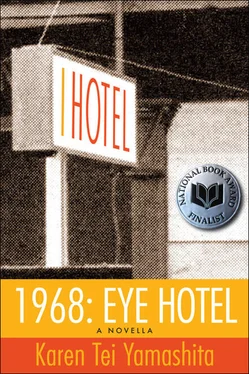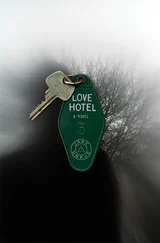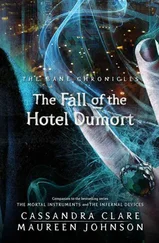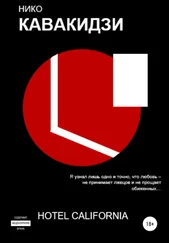Paul says to Edmund, “Chinese students meeting today. You going?”
“I have to work,” Edmund says. “Let me know what happens.”
Later, Paul reports. It’s one of the ICSA Chinese who speaks. That’s Intercollegiate Chinese Students Association. Fills in for a Chinese BSU. Chinese cat wears these shades that he never takes off. Works on being intimidating. He says, “What we are trying to do is to expose the contradictions of this society to our communities, separate fact from fiction. Fiction is that the Chinese have never suffered as much as the black or brown communities. Fact is the Chinese community has the same basic problems. Difference is that we got the neon lights and tourist restaurants. Fact is the restaurants are staffed by illiterate Chinese who work fourteen hours a day, six days a week. Fiction is Chinese businessman is doing good business. Fact is this is exploitation of Chinese immigrants who can only find work in sweatshops, laundries, and restaurants in Chinatown.”
Edmund says, “I’m not illiterate. What’s he talking about?”
Paul says, “It’s not about you. It’s about the others.”
Edmund says, “I am the others.”
Paul says, “There’s another meeting. This one is Third World. You get in if you’re Chinese.”
“I have to go home and work,” Edmund says. He always has to go home and work. Paul doesn’t have to go anywhere. And no one’s waiting at home for him.
Stokely Carmichael’s the main attraction. You get in to hear him if you got some color in your skin. BSU stands at the door and checks you out. Right on, brother. Paul likes this feeling of attitude rippling under his skin. Some white brother who’s sympathetic wants to get in. Says he knows Stokely personally. BSU takes him aside. “Nothing personal, brother, but this is about self-determination, you dig?” Paul files the information: self-determination.
Stokely tells it like it is. In a nutshell: you got to get control over the power structure. It’s not about you getting some Swahili classes. It’s about getting the methodology and the ideology. We got to heighten the contradictions to politically awaken our people. Easy to die for your people, but more difficult to live to work and kill for your people.
Then some other BSU cats get up and talk about the War of the Flea. Get down to the strategy, dig? How we are going to wear down the man. Paul nods; this is a Chinese thing. Guerilla practice of Uncles Ho and Mao. Lao Tzu. Art of War. Asians the brains behind the operation.
Next day in Chen’s class, it’s Mao Tse-Tung’s poetry. At least that’s the syllabus. But Mao’s practice comes to class instead. BSU and TWLF students walk in with their leather jackets, Afros, dark glasses, berets, what have you, but mostly attitude, and announce: This class is over. We are on strike until the pig administration meets our non-negotiable demands. Someone lights a match in the trash can, and everyone files out. War of the flea.
Month later, it’s more than fleas out there warring. Buses lining up at Holloway and Nineteenth, black folks stepping out like it’s a church function. All the big honchos of the community arrive: Reverends Cecil Williams and Lloyd Wake of Glide Memorial, California Assembly Rep. Willie Brown, Economic Opportunity Director and Delegate to the Democratic Convention Ron Dellums, and physician-publisher of the Sun-Reporter Dr. Carlton Goodlett. Besides which, some of these men are alumni of SF State. It’s a we-shall-overcome protest gathering. Even so, the students are in charge: On strike! Shut it down! We want the puppet! They pelt the windows of the administration building with rocks. Throw garbage cans at the doors. Turn over the cafeteria tables. Throw typewriters out the windows. Run into the library and push the books off the shelves. Stuff them down the toilets. War of the flea.
Inside, the bureaucrats hide the new and acting president, S. I. Hayakawa, in the bathroom. He must be the puppet! Outside the police line up with their riot gear, batons in their fists. You can hear S. I. speaking from his post over the Big Brother speaker system. This is your acting president. I order you to leave the campus at once. There are no innocent bystanders. I thought if we allowed you to talk you would calm down, but now this problem is escalating. I don’t want anyone to get hurt. His voice gets shrill.
Down in the field, publisher and physician Dr. Carlton Goodlett’s being carried on the shoulders of his cohort. Looks like two hundred colored people with Goodlett riding on top in a sea of white students, some say six thousand. He’s got his own bullhorn system, and he’s yelling, “We’re not subscribing to violence at this time! If the police feel that their duty is to provoke violence, all hell is going to break loose.” Who’s he talking to? S. I. in the bathroom? Six thousand white students? Tactical squad lined up on the green? They aren’t listening. Police got their orders. They arrest the good doctor and club the non-innocent bystanders. Throw everyone into paddy wagons. Situation explodes. Garbage cans get firebombed. Blow the motherfucker up! Folks go on a rampage, smash the windows of all the parked cars along Nineteenth. Someone climbs up to the wires of the MUNI car and yanks them off. M looks like a giant metal insect with a wagging antenna stalled in traffic. Another group pushes a UPI station wagon into the intersection, releases the brakes, and lets it roll. Folks hysterical and running in every direction.
Paul’s got his pockets filled with rocks, just in case. He’s in a stand-off with others, between defending himself from and sticking with the crowd. He sees a girl being dragged by her jacket collar into a paddy wagon, and he fingers a jagged stone in the deep of his pocket. He thinks he’s going to save her, but strong arms surround him from behind. He tenses, ready for his own struggle, then he recognizes the voice. “No! Don’t do it!” Chen has got him in one of those kung fu grips. “Run this way,” he commands. They slip away through Quonset huts faking as offices and classrooms. Paul looks back in shock at a charging cavalry of mounted police. Suddenly he sees himself multiplied, monkey orphans let loose, raising havoc. One by one, an invisible daddy cracks his multiplying monkey skulls. Who is free to be free at last?
There exists an unscientific attitude toward language that results in doctrinal disagreements. We must understand that problems are formulated in words, and that a change in the attitude toward language can help us become understanding listeners. Alfred Korzybski said, “A person tends to see the world as conforming to the words he has been taught to use about it.” There is a system of semantic principles to guide us in the everyday thinking, talking, listening, reading, and writing that leads us to our actions. Let’s examine the following story:
Once upon a time, there were two public institutions of higher learning, separated by a great bay but connected by a great bridge. The differences and the commonalities between the two sites of education were also greatly exaggerated.
Institution A considered itself a center of research and a factory for knowledge. Its president had said as much, that what the automobile had done for the first half of the twentieth century, the university could do for the latter half. The factory model of the university didn’t go over too well with the students, who protested that they were free individuals who would not be cranked out like cloned widgets on a production line. One of the institution’s most famous students had spoken passionately about how it was time to put one’s body on the gears and wheels to stop the machine. Students didn’t want to be the end product machined from a blueprint they did not believe. The factory model was probably the wrong model to choose, especially since most of the students were the children of middle-class professionals or had those sorts of hopes for their educations.
Читать дальше












